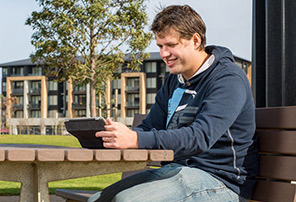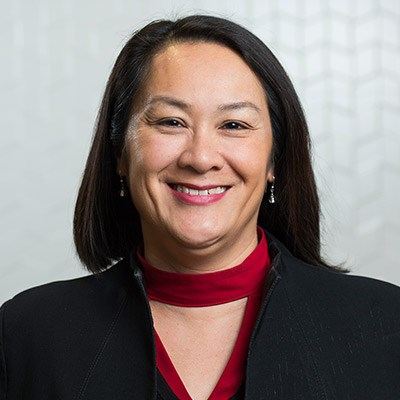You're viewing degree information for International students
You're an International student if you are:
- NOT an Australian or New Zealand citizen
- NOT an Australian Permanent Resident (including Permanent Humanitarian Visa holders)
Please remember your residency (the country you are currently in) has no impact on whether you are an Australian or International student.
UniSA Online degrees normally require international students to study outside of Australia. If you would like to study a UniSA Online degree within Australia, your visa conditions will need to allow online study. For advice on eligibility to study onshore in Australia, please contact us.
Bachelor of Communication
Degree Level Undergraduate
Year 2025
-
View full entry requirements Hide full entry requirements
Entry requirements
Admission criteria
The admission criteria have been grouped to assist you to easily find the information most relevant to your circumstances. However, you may fit into more than one and the university will consider applicants against each of the relevant criteria.
Certain conditions apply. For more information refer to Appendix 4 of the University's Selection and Entry policy.
Applicants are required to meet one of the following criteria with a competitive result:
Higher education study
- Successfully completed equivalent to a minimum of half a year of full-time study of a higher education program at a recognised higher education provider
OR
Vocational Education and Training (VET)- Complete an award from a registered training organisation at Certificate IV or above
OR
Work and life experience (for domestic students only)- Passed a UniSA Online literacy and numeracy test and have relevant work experience, or
- Completed a 12-month UniSA Foundation Studies program or equivalent, or
- Qualify for Special Entry
OR
Recent secondary education- Completed a secondary education qualification equivalent to SACE, such as an interstate year 12 or international qualification
Essential requirements for admission
Prerequisites
NoneAssumed Knowledge
NoneEnglish language entry requirements
In addition, international students who speak English as a foreign language must have obtained one of the following standards within the last two years prior to admission. Possession of one or more of these qualifications, in addition to the academic entry requirements, does not, in itself, guarantee a place at the University of South Australia. Applications are considered on an individual basis and selection is competitive. Where previous study/work experience was conducted in English, the application must be accompanied by certified documentation from the educational institution/employer certifying that the language of instruction/employment was English.English language testPlease access the following link for a comprehensive list of English language tests accepted by UniSA and other important information in relation to meeting the University’s language requirements: English Language Equivalence Table (PDF)- IELTS total [6.0]
- IELTS reading [6.0]
- IELTS writing [6.0]
- IELTS speaking [6.0]
- IELTS listening [6.0]
Admission Requirements by Country
Kenya KCSE (average) B Malaysia STPM (best 3) 6 Malaysia UEC 32 Norway GPA 2.8 Pakistan HSSC 75 Sri Lanka A Levels (best 3) 6 Sweden GPA 12.5 UK Board GCE A Levels/HK Board 6 Vietnam 7 Australia 65 IB (best 6) 26 USA SAT (1600) 1050 India (best 4) State Board 70 India (best 4) Central Board 60 HKDSE 15 Nepal NEB 2.41 Bangladesh HSC 3.5 Canada High School (OSSD) 60 Eynesbury FSP 310 German Abitur 3.8
Degree overview
-
Learn how to deliver effective communication strategies across a range of traditional and emerging digital media platforms.
- Focus your studies on social media, content creation and journalism.
-
Develop the critical and analytical thinking skills required for strategic planning and communication management.
-
Choose a degree developed in consultation with industry experts and learn from academics who are leaders in their field.
-
Improve your communication skills and apply your knowledge in the workplace while you study.
Snapshot

Study On Demand – a 100% online communication degree designed specifically for online learning. Take full control over your study - access support seven days a week, plan your study to fit around your life, view learning resources 24/7, and log into the interactive online environment anywhere, any time and on any device.
Powerful communication is about crafting the right message, at the right time to disseminate knowledge and information to a variety of audiences, across various channels and media.
This degree will equip you with the knowledge and skills to create and deliver effective communication strategies across a range of traditional and emerging media platforms.
Along with your flair for writing, you’ll learn to build effective social media strategies, manage reputations in a crisis, as well as evaluate and improve communication practices. You’ll be able to swiftly apply your skills well before you graduate and will come out as a savvy communication professional ready to build your career in this fast-paced and dynamic industry.
What you'll learn

UniSA Online’s Bachelor of Communication prepares you to work across a vast, technologically diverse media landscape. Ranked top 10 in Australia for graduate skills in media and communications1, our graduates come out with the knowledge and skills that employers are looking for, no matter what industry you choose to work in.
You’ll develop expertise in core communication areas such as public relations, marketing, communication research, promotional communication and strategic communication planning – and you’ll graduate with specialist knowledge in journalism and social media, with the skills to deliver effective communication strategies across a range of industries and digital media platforms.
This degree allows you to apply what you’ve learned to real-world scenarios. In your final year, you’ll complete a comprehensive, industry-standard communication plan that you can add to your resume.
1Ranked #7, ComparED (QILT) Student Experience Survey 2021-22, Communications – Skills Development Indicator (Undergraduate). Public universities.
Why Bachelor of Communication

Communication is at the core of how we live today in an increasingly connected world – and skilled communicators are essential in every organisation.
Taught by academics with strong industry connections, you'll learn to develop effective communication strategies and engaging content for both traditional and new digital mediums.
Your understanding of media management, audience behaviour and professional writing is underpinned by a theoretical understanding of public communication and technical skills in writing and editing.
This degree will prepare you to work across a vast, technologically diverse media landscape. You’ll explore current and emerging trends in the field – so you can be confident that what you’re learning will prepare you for the workforce, no matter what industry you choose to work in.
Your career
Communication gives students a wide range of employment options, both in terms of the type of work they undertake and the industry sectors in which they can be employed.
From healthcare, financial services, IT, community organisations to not-for-profit and government, the opportunities are endless. And the industry is constantly changing. A decade ago, the role of a social media manager might not have even existed. Today, however, almost every organisation is involved in social media in one way or another.
A UniSA Online Communication degree can help you pursue the following careers:
-
Communication officer: Convey an organisation’s internal and external messages; plan and write content for promotional publications, websites, blogs and social media profiles; prepare media releases and liaise with journalists; develop advertising material for print, radio and television; and coordinate events.
-
Content creator and writer: Develop compelling content, creative concepts and copy for a range of marketing and communication materials including email campaigns, long-form articles, style guides, social media, written scripts, and landing pages; work closely with designers, web developers, photographers, and videographers; and use insights and analytics to continually optimise content.
-
Digital and social media manager: Build and execute social media and digital strategies; generate, edit, publish and share daily content on a range of platforms; create editorial calendars and distribution schedules; moderate all user-generated content; and continuously improve and optimise campaigns by analysing social data and metrics.
-
Media liaison officer: Act as the point of contact for members of the press, journalists and other media representatives; develop communication materials including media releases, fact sheets, website copy and briefing notes for the media; coordinate media events; and undertake media monitoring.
-
PR coordinator: Generate media coverage to help raise the profile of the organisation; deliver creative solutions and new ideas across traditional and social media; develop crisis communication strategies and manage reputation issues; and build long-term relationships with journalists, influencers and bloggers.
-
Marketing and communications officer: Plan, develop and produce marketing and communication materials for online and print; monitor social media activity and respond to comments and enquiries; write and distribute media releases; develop reports and track ROI for marketing and advertising campaigns; develop EDM communications and landing pages; and ensure all marketing and communication activities align with an organisation’s brand style guide.
-
Corporate communication adviser: Prepare communication strategies and materials including media releases, briefing notes, thought leadership pieces, and speeches; build and develop strong relationships with key media and other external stakeholders; provide crisis and issues support when needed.
-
Online editor: Write, edit and proof-read compelling content across a range of online channels; engage with stakeholders across the organisation to collate and produce a range of topics; manage and monitor workflow to meet deadlines; publish website content using content management systems (CMS).
Learn more about your career in Communication >
Thinking of studying soon?
Industry facts
Enquire now to study with UniSA Online
Control how and when you study with our 100% online degrees.
Your study experience and support
Study On Demand
Our online career-focused degrees give you full control and ultimate flexibility over your study. It’s Study On Demand, on your schedule, on your terms.
- Designed specifically for your online learning
Designed by a team of academic and online experts, our course materials are delivered in an interactive way using innovative digital technology and state-of-the-art teaching and learning resources. - Study when it suits you
Our online degrees support students who lead busy lifestyles. With four start dates a year in January, March, July and September there is no need to interrupt your life. - Take control of your study schedule
With all content available from day one of your course, you have the power to plan your study schedule in advance. - Finish each course in 10 weeks
Our courses are delivered within 10-week terms to keep you motivated throughout your degree. Study two courses a term or just one. - 100% online study
You won’t need to come onto campus for coursework, assessments or exams. Complete all study for your degree where it suits you. - Get the help you need
Whether you need help with course content or assessments, we offer the academic support and services you need to be successful in your studies. - Adjust your study to your life
There’s no need to interrupt work and family life or spend money on travel and student accommodation. Organise study around your life. - Learn from world-renowned academics
Get a degree that’s designed and taught by leading academics and industry professionals. - 100% online interactive learning environment
Our interactive online learning environment supports all your study needs. Log in anytime, on any device, wherever it suits you. - Access a library of over 700,000 digital resources
Access a library of more than 700,000 digital resources including e-books, videos and journal articles. Our Ask the Library virtual service can help you locate, access, evaluate, use and reference a range of information resources.
What others are saying
IT Requirements
Generally, any desktop or laptop computer purchased in the past three years should be capable of meeting your online learning needs. While mobile devices such as tablets and smartphones will be able to access most of your online course content, there are likely to be elements of most courses where we recommend you use a desktop or laptop computer. Your computer should be able to:
- run a modern browser (Microsoft Edge, Firefox 24, Safari 5, or Chrome 32 or later versions)
- run Java
- run programs to create documents, spreadsheets and presentations
- use a web camera and headset (or ear pods with microphone)
- Some UniSA Online degrees require an online exam. The online exam software – Remote Proctor Now – has specific capability requirements. Please refer to the system requirements prior to conducting your exam to ensure your computer is compatible.
Access free IT software and resources
As a UniSA Online student, you'll:
- Get free access to the full Office 365 ProPlus suite, which includes full versions of Word, PowerPoint, Excel, Outlook, OneNote, Publisher, Access and Lync software. Install the full suite on up to five different devices (PC and Mac compatible).
- Get 1Tb of personal storage that syncs with your PC or mobile device through OneDrive - it's like an extra hard drive that allows you to open any of your files from any of your devices, whenever you need them.
- Get free access to LinkedIn Learning - Access more than 5000 video courses on a broad range of topics such as: the Microsoft Office suite, time management and study skills, health and wellbeing, communication and presentation skills, photography, film making and designing your own games or mobile apps.
- Be able to connect with others using Microsoft Teams, Yammer and the Outlook Web App.
There are some degrees that have specialised software requirements. We've made this software available to students to access for free - you'll be able to download and install any of the required programs on your own device anywhere and anytime. See if your degree requires specialised software.
Check your device
Our computer system test will determine if your device has the base system resources and software required to study online. It'll also check the speed of your internet connection.
See if your computer, laptop or device is all set up and ready to go – it takes just a few seconds.
The application process is easy – just follow these simple steps:
-
Submit an online enquiry
If you're ready to apply, the first step is to fill out and submit our online enquiry form. Here you'll be asked a series of questions to see if you're eligible. Following your online enquiry, one of our Degree Advisers will contact you at your preferred time to discuss the application process.
Enquire now > -
Speak to a Degree Adviser and start your application
If you're eligible, you'll receive an email outlining the entry requirements and the relevant documentation you need in order to be considered.
In order to verify your academic qualifications, you'll need to upload relevant documents like your official parchment, certificates or transcripts. If you have work experience, you will need to upload your CV as well as any other documents like work references, professional recognition or accreditation or your training certification.
Your email will contain information on the specific documents you need to provide as well as a link to begin your application. You'll be asked to create an account and set your own password.
-
Complete your application and send through your documents
In order to proceed with your conditional offer, you’ll need to complete your application and provide required evidence of your previous study or work experience.
Enquire now >
Alternative Pathways
- UniSA College Undergraduate Certificate in University Studies (Creative Studies)
- UniSA College Diploma in Creative Studies (Communication)
- UniSA Online UniStart
Online Course Facilitator
-
When should I apply?
UniSA Online degrees start four times a year in January, April, June and September. There are key application dates for each term. If you're looking to apply for credit, there are different closing dates you need to be aware of, so it's always best to double check. Key dates can be found at unisaonline.edu.au/key-dates.
-
Do I have to be online at set times?
All of our courses are asynchronous, meaning you choose when to study, whenever it suits you. However, if your degree has online exams, you will need to sit these at a designated date and time. Some courses may also require you to speak to your academics via phone or online communication channels at a mutually agreed time as part of your assessment.
-
What academic support is available?
Our academics are available seven days a week, including weeknights. Throughout your degree, you’ll be supported by our highly experienced academic team of Online Course Facilitators and casual academics. Our teaching team will guide you through your learning and ensure you have an outstanding, high-quality education.
They can help you with your course materials and assessments, provide feedback on your work, assist you with referencing, and can answer any other course-specific queries.
You’ll be able to contact your academics via email, online discussion forums and live messages in the online learning environment. You can also communicate in real-time and chat face-to-face with your academics online.
If you need after-hours learning support, Studiosity is a great resource that can help you with your writing, academic language, grammar and referencing. You’ll also be able to chat online with a Studiosity online adviser.
-
How is my degree structured?
Full-time students study two courses each term. It makes earning a degree completely achievable, especially if you’re working. Your degree is delivered over four terms each year. Each term runs for ten weeks with two-week breaks in between each term.
You’ll also have the option to go part-time, or switch between the two. If you need to take a break in your study, that’s an option too. We recommend speaking to your Student Adviser who can help you update your study plan and check when your courses are offered.
-
What career prospects do I have with my university qualification?
Our degrees are designed in conjunction with industry experts, employers and professional associations, and informed by the latest developments in your field. You will graduate with in demand skills and up-to-date knowledge required by industry.
You will be studying with a university known for its employment outcomes. Your UniSA degree is more than just a piece of paper – it will prepare you to start your career, or take it to the next level. UniSA's online students have graduate employment rates well above the national average.*
UniSA Online qualifications follow the same Government Higher Education Standards Framework as our on-campus degrees. The parchment you receive at the end of your degree will be the same as any other University of South Australia student.
*UniSA External UG full-time employment rate 83% Graduate Outcomes Survey 2018
-
What are the main differences between online, on-campus and distance education?
The knowledge you gain from each mode of study is the same – it's how you get there that's different. When you study online, everything from your course material to weekly activities and assessments are fully online. You'll communicate with academic staff and students via live messages, online discussion forums and email.
Studying on campus requires students to physically come on to campus at specific times to attend lectures, tutorials and practicals. On-campus students have face-to-face contact with academics and fellow students and also communicate via email and online discussion boards.
Distance Education involves physical course material packages being sent to students, usually print based but occasionally audio or video. Communication is usually via telephone, mail and email. In today’s digital era, distance education has been superseded by online education.
More FAQs












